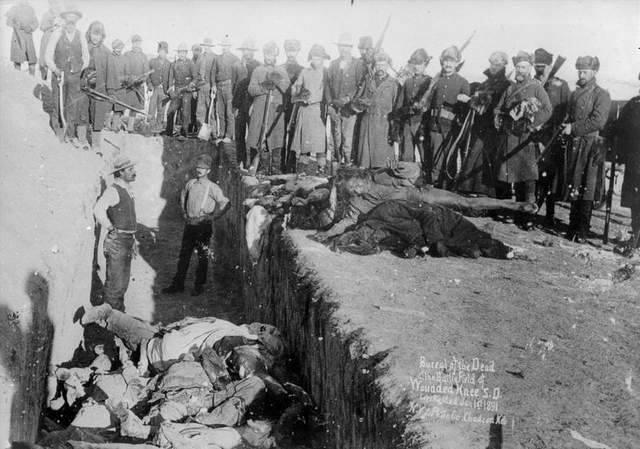
- Details
- By Kaili Berg
The U.S. Department of Defense has announced a review of the Medals of Honor awarded to soldiers who committed the Wounded Knee Massacre in 1890.
This new review comes after years of advocacy and legislative efforts to address the controversial bestowal of the nation’s highest military honor for actions that resulted in the deaths of hundreds of Native Americans in a single day.
On December 28, 1890, the U.S. Army intercepted a band of Miniconjou Lakota, consisting mainly of women and children, on their way to the Pine Ridge Reservation in South Dakota. The Army intended to disarm the Sioux men, but the situation quickly escalated into chaos and violence. Soldiers opened fire indiscriminately, resulting in the deaths of approximately 300 Native Americans, with women and children comprising more than two-thirds of the fatalities.
Despite the brutality of the massacre, approximately 20 soldiers were awarded the Medal of Honor for their actions. This decision has been a source of deep pain and anger for Native communities and advocates who argue that the medals glorify an act of violence against unarmed, surrendering people.
Efforts to rescind these medals have gained significant support over the years. The Remove the Stain Act, a bipartisan, bicameral bill
aiming to revoke the medals awarded for the Wounded Knee Massacre, was introduced in 2021.
This legislative push has garnered the backing of the South Dakota State Senate, 213 Tribal Nations, and major Tribal associations, including the Coalition of Large Tribes and the National Congress of American Indians.
Secretary of the Interior Deb Haaland (Laguna Pueblo), the first Native American to hold a Cabinet position, has been a leading voice in addressing this historical injustice. During her time in Congress and the Biden Administration, she has consistently advocated for the rescission of the medals, emphasizing the ongoing harm they cause to Native communities.
The Defense Department’s review was ordered by Defense Secretary Lloyd Austin after consultations with the White House and the Department of the Interior. This action was recommended in the 2022 defense bill, reflecting a push by lawmakers to reassess the awards.
The review will be conducted by a special panel of five experts, who will examine the historical records and documentation of each soldier’s actions.
In response to the Department of Defense’s announcement of the review, Secretary Haaland issued a statement on July 25, expressing her gratitude for the move.
“The significance of the Wounded Knee Massacre and the historical record put these Medals of Honor in a class of their own: medals that glorify violent actions against unarmed, surrendering people—actions for which Congress itself has felt compelled to officially apologize,” Haaland said in the statement. “I believe that allowing the nation’s highest military honor, awarded for valor and distinguished conduct in combat, to continue to rest with the legacies of 20 soldiers who participated in this shameful massacre devalues and degrades the Medal of Honor while causing ongoing harm to Native people. That’s why now is the time for a meaningful step to ‘remove the stain’ of these medals.”
As the review progresses, it will be essential for the involved parties to communicate openly and consider the perspectives of the descendants of those who suffered the massacre.
The outcome of this process could serve as a precedent for addressing other historical injustices and ensuring that military honors are awarded appropriately and respectfully.
More Stories Like This
Native News Weekly (August 25, 2024): D.C. BriefsNavajo Nation Mourns the Passing of Former Vice President Rex Lee Jim
Deb Haaland Earns Endorsement From Communications Workers of America Local 7076
University Soccer Standout Leads by Example
Two Native Americans Named to Democratic Congressional Campaign Committee's“Red to Blue” Program
Help us defend tribal sovereignty.
At Native News Online, our mission is rooted in telling the stories that strengthen sovereignty and uplift Indigenous voices — not just at year’s end, but every single day.
Because of your generosity last year, we were able to keep our reporters on the ground in tribal communities, at national gatherings and in the halls of Congress — covering the issues that matter most to Indian Country: sovereignty, culture, education, health and economic opportunity.
That support sustained us through a tough year in 2025. Now, as we look to the year ahead, we need your help right now to ensure warrior journalism remains strong — reporting that defends tribal sovereignty, amplifies Native truth, and holds power accountable.
 The stakes couldn't be higher. Your support keeps Native voices heard, Native stories told and Native sovereignty defended.
The stakes couldn't be higher. Your support keeps Native voices heard, Native stories told and Native sovereignty defended.
Stand with Warrior Journalism today.
Levi Rickert (Potawatomi), Editor & Publisher


